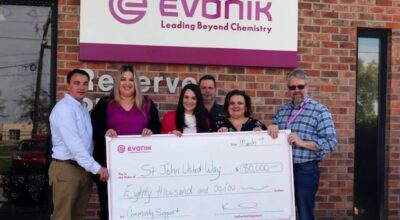Operation Restoration receives grant to increase higher education opportunities in prisons
Published 4:05 pm Wednesday, June 14, 2023
|
Getting your Trinity Audio player ready...
|
NEW YORK CITY — The Mellon Foundation has announced over $5 million in grantmaking to seven colleges, universities and other organizations as part of the Foundation’s commitment to expanding opportunities and increasing resources for higher education in carceral environments. These new grants—part of Mellon’s larger mission of fostering equitable and broader access to humanities learning opportunities in the carceral system—bring Mellon’s total funding in Higher Education in Prisons (HEP) to more than $60 million since 2015.
Among the seven grantees is the locally-based Operation Restoration, which provides support to women and girls impacted by incarceration to recognize their full potential, restore their lives and discover new possibilities including the value of higher education.
Postsecondary educational programs in prisons have been shown to bolster the families and communities they touch, yet there remains a fundamental lack of higher learning opportunities for incarcerated and formerly incarcerated individuals. According to a 2022 survey by the Alliance for Higher Education in Prison, only around 600 of nearly 5,000 state and federal prisons and local jails have higher education programs. In the ever-evolving world of higher education in prisons–especially as Federal Pell Grants are reinstated next month for incarcerated learners–it is crucial to adopt new grantmaking strategies and support programs that address emerging needs in the field.
“We are excited to receive this grant from the Mellon Foundation. Many of our programs center on education as a first step to helping our clients unlock their potential,” says Operation Restoration Founder, President & CEO Syrita Steib, a St. James Parish native. “More than 40% of incarcerated persons do not have a high school diploma. Despite a 30% recidivism rate for women within five years of release, data shows that 95% of formerly incarcerated persons who seek education stay out of prison.”
As the only arts and humanities funder supporting higher education in prisons, Mellon advocates for a holistic approach, centering innovative programs that promote the perspectives and leadership of system-impacted individuals, as well as those that deliver education and resources to often overlooked populations and geographies. Further, this strategy drives the funding of programs and curricula that offer a deep understanding of what makes us human–an understanding that is especially needed in the often dehumanizing constraints of carceral settings.
“Promoting liberal arts higher education in carceral settings is a crucial element of the Higher Learning program’s strategy for enhancing equitable access to advanced humanities thought and knowledge,” said Phillip Brian Harper, program director for higher learning at the Mellon Foundation. “Mellon is firmly committed to the idea that everyone must benefit from the liberatory power of the humanities, and our evolving portfolio of support for the education of incarcerated individuals epitomizes that commitment.”
The Mellon Grant will support the expansion of Operation Restoration and Tulane College of Professional Advancement College in Prison Program for women incarcerated at Louisiana Correctional Institute for Women (LCIW) and establish post-release leadership development opportunities.
To achieve a more systemic impact within the rapidly developing system of higher education in carceral settings, Mellon aims to fund prison education programs whose locations, methods, or demographics extend impact and further cultures of learning in carceral spaces; promote system-level transformations that improve educational opportunities for incarcerated and formerly incarcerated students; and support leadership development, particularly for those directly impacted by the criminal legal system.
For nearly a decade, Mellon has supported projects that foster broad and equitable access to higher learning opportunities in carceral settings. Imagining Freedom, Mellon’s new $125M initiative, expands upon this commitment by addressing the problems of mass incarceration and the criminal legal system. The Foundation’s grantmaking through Higher Education in Prisons will continue to focus on supporting humanities-based courses and degrees for incarcerated learners, as well as efforts to make internships, research opportunities, and other forms of intellectual and personal support available to these students.




